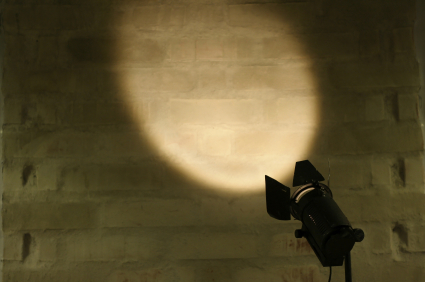I write a fair amount here on Mission to Learn about focused learning; about things like carving out time for learning, setting goals, concentrating, practicing, and reflecting. These are all necessary activities for mastering particular skills or bodies of knowledge, but they are, of course, only the more obvious, visible aspects of what we tend to think of as learning.
The greater part of learning, the stuff we engage in moment-to-moment, day in and day out, often has little to do with achieving conscious goals. Whether we know it or not, our minds and bodies are constantly learning from our experiences and the environment around. And at a semi-conscious level, we are constantly making choices that contribute to our ongoing learning – the conversations we engage in; the media we watch, read or listen to; the places we go, just to name a very few.
I think a distinction that the philosopher Alan Watts made many years ago between what he saw as “spotlight consciousness” and “floodlight consciousness” can be applied to these two types of learning:
Generally speaking, we have two kinds of consciousness. One I will call the “spotlight,” and the other the “floodlight.” The spotlight is what we call conscious attention, and we are trained from childhood that it is the most valuable form of perception. When the teacher in class says “Pay attention!” everybody stares, and looks right at the teacher. That is spotlight consciousness; fixing your mind on one thing at a time. You concentrate, and even though you may not be able to have a very long attention span, nevertheless you use your spotlight: one thing after another, one thing after another…
However we also have floodlight consciousness. For example, you can drive your car for several miles with a friend sitting next to you, and be completely absorbed in talking to your friend. Nevertheless, your floodlight consciousness will manage the driving of the car, will notice all the stoplights, the other idiots on the road, and so on, and you will get there safely without even thinking about it.
Even if you happen to find Watts a bit dated and “groovy,” I’m betting you can find some value in his spotlight-floodlight distinction and how it might apply to learning.
At a personal, organizational, and societal level, we tend to focus on and value “spotlight” learning much more highly than “floodlight” learning. The spotlight perspective dominates the world of degrees, certifications, and even much of the self-help literature that claims to carve out alternate paths. There’s nothing surprising or even necessarily wrong with the bias towards the spotlight – things tend to be easier to see, understand, and manage in the spotlight.
But being aware of and regularly tuning into floodlight learning is increasingly important in a world where we are bombarded daily with information and influences, where we have a bewildering array of choices about how and with whom we interact (for example, in social networks). So much of learning is driven by context and circumstances – whether we choose them or they are thrust upon us, but we don’t often think critically about our context and circumstances. We often learn on “auto-pilot” – not unlike how we often drive on auto-pilot. That may be fine, in most cases, but among other possible dangers it can cause us to gravitate toward what is familiar, comfortable, easy – towards a state in which little significant learning is happening at all.
Focus, concentrate, set goals – let your spotlight shine bright. But occasionally peer out into the floodlight and make sure you like what you see.
Jeff






Thanks, Brent – I appreciate your comment and your perspective, but I don’t see any need for the “perhaps you should listen” jibe. I have read and listened to a great deal of Alan’s work and it seems clear enough to me that he feels there is a place for both spotlight and floodlight. Indeed, he continually makes the point that every condition exists in relation to its opposite – and that is the natural state of things. – Jeff
Perhaps you should listen to some of Alan’s work. We live in a society that only values spotlight attention, any other kind of attention is deemed “useless”. I would argue that your floodlight should dominate and spotlight should be used when appropriate, i.e. drawing, fixing your car etc.
When spotlight attention is the only means of attention we have no real view, the world is not divided into neat squares (as much as we try and make it so) but rather as Watts out it “googly goop”. We are at a time in history where mind expansion is not only necessary but a requirement if we wish to continue inhabitting this earth. To understand that we exist with everything else not seperate from it.